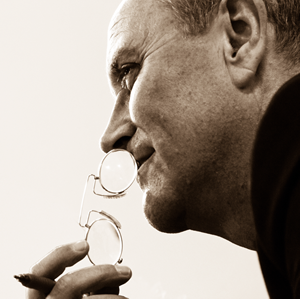State Change is the Name of the Game: Further Adventures with Master Teacher John...
John Chitty, RPP, RCST®, (1949-2019) had many passions in his work: The two-chair method (working with polarity and pendulation), babies, relationships, energy medicine, states of health versus pathology, and autonomic nervous system state change. He had advice for every occasion from personal tragedy to business practice. He told several stories over and over again, which clued me into things he was most passionate about. One of them was the following, stated in an adamant and sometimes outraged insistent tone:
“I have people coming in here and telling me that they want to get to root of their trauma to be rid of it once and for all. Well, I don’t think that you need to get to the root of trauma; all you need is state change. (picks up hand and points at me) State change is the name of the game (inflection and repeated pointing with every word).”
“Yes sir!” I’d say.
Passion & Presence: A Couple’s Guide to Awakened Intimacy and Mindful Sex
One simple sentence says it all: “Great sex is a mind-set, not a skill-set.”
Maci Daye embodies the essence of her new book, Passion & Presence: A Couple’s Guide to Awakened Intimacy and Mindful Sex, in this short statement. Yes, readers receive exercises to practice concepts presented throughout the book, but the crux of success resides in mindfulness including presence, curiosity, and authenticity, and a commitment to one’s self, one’s partner and the relationship.
Second Editions: Are They Worth The Work?
I focus my reviews on prepublication manuscripts and “hot-off-the-press” texts. Because I’m a small niche publication, I try to offer readers material they cannot get else where.
But I started to wonder about revised and second editions. All things considered, it can take years for people to write and publish their work. The time, the turmoil, the tears. It takes a toll. Combine joy, release, and celebration to that mix? You just might create a tsunami of emotional and/or physical impact on one’s body and soul.
The question nudging my brain awake at 2 am was: Why do authors go through that ordeal with the same material? Isn’t once done, good enough?
An Honorary Urban Anthropologist
Many of my clients are faced with returning to environments which were and are emotionally hostile and traumatizing. They are treated the way they were treated in childhood. Even thinking about these past events resurrects post traumatic stress. But clients believe they have no alternative than to return to those environments. Work, holidays, illness, deaths call for their return. The return then reinforces past emotional wounds. These events occur time after time, but their underlying dynamics are unconscious. I call these events anniversary events (Kisch, 2019). Most often just being aware of returning to these environments is sufficient to trigger anniversary reactions. How does one protect clients from this re-traumatization when just talking about it does not work?
Grief’s Reach: Avoiding its Lure Back into Early Developmental Shame
When we help clients neurobiologically separate out early shame from grief, we bring them to the awareness of how present day experiences are actually a confusing entanglement of calling cards from the past. As the responses separate and integrate with support into the client's present day self, a felt sense of choice and autonomy emerge.
Keeping Our Bodies in the Room: The Relevance of Bodily Experience in Psychotherapy Practice...
This conference brings together two dynamic clinician-authors at the heart of the contemporary discourse on the place of the body and somatic experience in psychotherapy and psychoanalysis: William Cornell, author of Somatic Experience in Psychoanalysis and Psychotherapy (2015) and Jon Sletvold, author of The Embodied Analyst: From Freud and Reich to Relationality (2014).
The program will combine conceptual elements with discourse, clinical and supervisory examples, demonstrations of training and supervision techniques, and a good deal of experiential work drawn from the speakers' many decades as clinicians and trainers. This diversely formatted program will appeal to psychodynamic and analytic clinicians, those involved in the training and supervision of psychotherapists, and somatic psychotherapists who want to experience the clinical and training styles of these internationally-known body psychotherapy innovators.
Interested in being Editor-in-Chief of an international peer reviewed Journal?
The EABP and USABP are seeking applications for their new Editor-in-Chief (an EABP member) and their new Deputy Editor (USABP member). The role starts January 2019.
Editors will work with their new managing editor, Antigone Oreopoulou, thus forming the IBPJ editorial team. The team is responsible for:
identifying the journal's aims, scope and direction
maintaining the professionalism and quality of the Journal content
publishing the journal
They are seeking experienced clinicians with good writing skills (having published one's own book or articles) and a good sense of the English language (knowledge of APA style and formatting is also necessary), organizational skills and communications skills are also needed.
If you are interested, please contact Antigone Oreopoulou at [email protected]
Intimacy from the Inside Out
Intimacy from the Inside Out (IFIO) by Toni Herbine-Blank, Donna M. Kerpelman, and Martha Sweezy is geared toward psychotherapists who are seeking an alternative method for practicing couples therapy. IFIO therapy stems from Internal Family Systems therapy (IFS), a model developed by Richard Schwartz in the 1980s as an approach to working with individuals and families, then later expanded to include couples. IFIO couple’s therapy involves a two-step process of planning for the predictable universal issues that couples face and responding skillfully to other unexpected factors. Couples entering IFIO therapy often hold the two goals of feeling safe within their relationship and reestablishing intimacy. In the initial session, the therapist meets with the couple to inquire about hopes and goals, assess their ability to accept differences in each other, and then offer a perspective on the possibilities of treatment.
Seeking Somatic Clinicians with Experience in Hoarding
I am currently recruiting somatic therapists who have experience with hoarding disorder in their practice for my dissertation research. If this research does not apply to you, I would appreciate you sharing this information with relevant psychosomatic communities. Participants are asked to share their experience working with client(s) diagnosed with a form of hoarding (hoarding disorder or OCPD) using a narrative inquiry method of interviewing.
Call for papers is now open
EABP BERLIN CONGRESS
BODY PSYCHOTHERAPY AND CHALLENGES OF TODAY
6-9 SEPTEMBER 2018
REGISTRATION IS NOW OPEN
CALL FOR PAPERS IS NOW OPEN
According to the EABP's recent newsletter:
The next...













